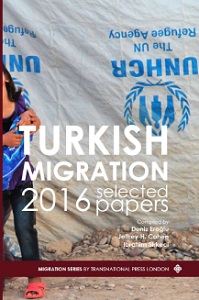Transnational Identity among the Bulgarian-Turkish Migrants in Turkey
Transnational Identity among the Bulgarian-Turkish Migrants in Turkey
Author(s): Özge Kaytan
Subject(s): Geography, Regional studies, Cultural Anthropology / Ethnology, Social differentiation, Migration Studies, Ethnic Minorities Studies, Identity of Collectives
Published by: Transnational Press London
Keywords: Turkey; Bulgaria; migration; transnational; identity;
Summary/Abstract: multiple constructions, including memories, experiences, observations and many more in the case of migrants. Nevertheless, migration is not a finite event, it is an ongoing process in which migrants deal with different life patterns and social relationships, which have economic, social and cultural characteristics (Basch et al. 1994; Glick-Schiller et al. 1992, Guarnizo and Smith 1998; Levitt 1999, 2001 in Park, 2007:201). The Bulgarian-Turkish migrants have transnational identities, which have multiple attachments to more than one space, and indicate an interplay between ethnicity and nationality. The borders of nation-states do not determine the transnational identity perception of migrants. These borders may only indicate political confinements. However, for Bulgarian-Turkish migrants, the border between Turkey and Bulgaria refers only to a geographical location, which is not related to any political boundary. Hence, a visible interplay of ethnic identity and national identity among Bulgarian Turkish migrants is a significant determinant for their transnational identity. In Bulgaria, they used to have a strong ethnic identity, whereas in Turkey it turns out to be an even stronger national identity. However, they also tend to equalize ethnicity and nationality in Turkey, as they acquired a majority status in Turkey. Nevertheless, they have transnational social attachments between these two political territories, though it does not matter for them if it is a political border or not. Some migrants tend to see these two territories as homelands, depending on the context, since “some migrants identify more with one society than the other, the majority seem to maintain several identities that link them simultaneously to more than one nation” (Schiller, Basch, Blanc-Szanton 1992 in Vertovec 2009:6).
Book: Turkish Migration 2016 Selected Papers
- Page Range: 116-122
- Page Count: 7
- Publication Year: 2016
- Language: English
- Content File-PDF

